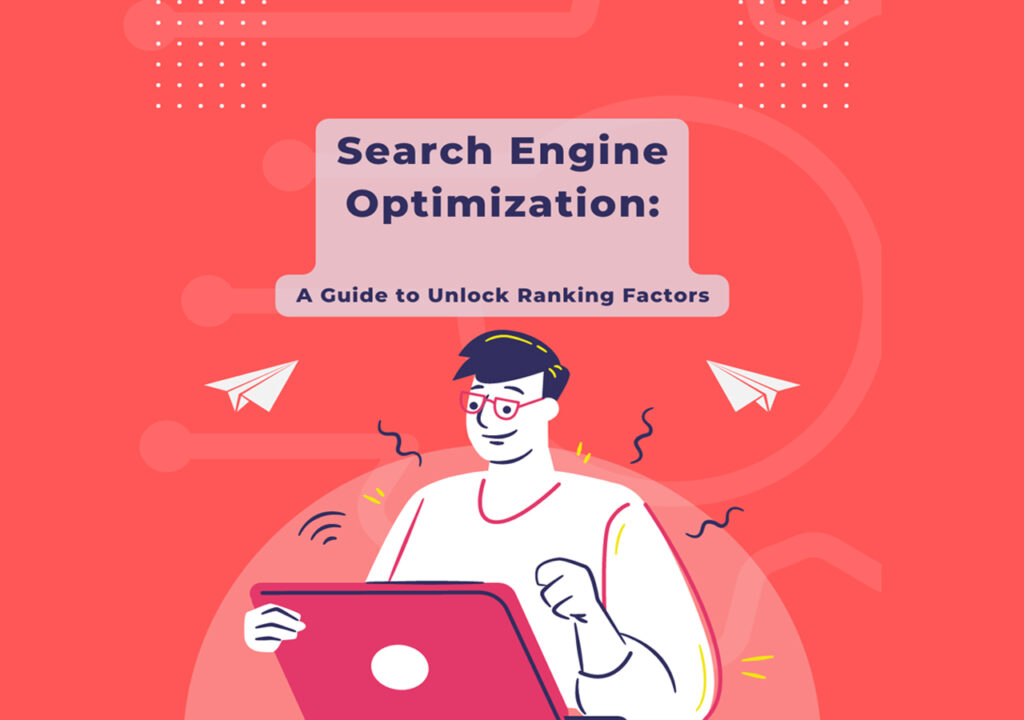Search Engine Optimization (aka SEO) involves optimizing webpages to appear higher in organic search engine results, which can lead to increased website visibility and higher click-through rates for your business.
What Is Search Engine Optimization?
Search Engine Optimization (SEO) is a key component of any successful digital marketing strategy to build an online presence. It is the practice of optimizing a website or other digital asset in order to increase its visibility, user behavior, and rankings in search engine results.
SEO involves making a website logical to search engines by:-
- Updating its content
- Making it user-friendly
- Optimizing its structure and code
By opting above formula, your website is more likely to appear in organic search results for relevant keywords and phrases. You can use SEO to increase brand value and drive more traffic to your website.
Implementing a comprehensive SEO strategy is essential for your business to gain visibility in today’s competitive digital environment.
New technologies are continuously emerging, while old methods of business operations must be adapted to keep up with the changing times. This creates a challenging task for businesses of all sizes to navigate, requiring innovative strategies of the latest digital trends to remain competitive.
Your business always needs to stay up to date on the latest advancements such as:
- Digital Marketing
- Social Media
- Analytics
- Data Security
- Artificial Intelligence
- Machine Learning
- Cloud Computing
Also, you must ensure to leverage the most effective digital tools and strategies to maximize their reach, engagement, and ROI.
Maximizing reach, engagement, and ROI should be your business’s top priority to effectively gain customers and increase brand recognition.
As a Digital Marketer, you should focus on developing a winning digital marketing strategy that utilizes a combination of tactics like content marketing, SEO, and paid advertising (PPC), among others.
If you regularly measure and evaluate the performance of these tactics you will have a chance to increase customer reach, end-user engagement, and return on investment (ROI).
Regularly measuring and evaluating the performance of these tactics can help businesses identify opportunities to increase their reach, engagement, and ROI.
We will now outline the two forms of search engine optimization that can be employed on your website in order to achieve higher rankings on search engines.
On-Page SEO & Off-Page SEO
On-Page SEO
As an online business owner, understanding and implementing strategies for on-page SEO is essential to the success of your website.
On-page SEO refers to the optimization of individual web pages, including the content and HTML tags, and source code to make them more visible to search engines (SERPs) according to google guidelines.
It’s important to note that the on-page of a website is only one of many components of overall SEO, but it can make a major impact on your website’s performance.
Here are the important On-Page SEO Components to Consider:-
- Content
- HTML
- Website Architecture
We have further discussed in detail all these components in our On-Page SEO guide for beginners.
Off-Page SEO
Off-page SEO is a vital component of any successful digital marketing strategy. It is the process of optimizing a website’s presence outside of its own domain, in order to gain search engine rankings.
To describe it in simple words you are generating backlinks to your website or domain.
Off-Page SEO is a complex and extensive topic and can be a challenging process for those unfamiliar with its ins and outs.
Here are the important Off-Page SEO Components to Consider:-
- Link Building
- Content Promotion
- Social Media Engagement
We have further discussed in detail all these components in our Off-Page SEO guide for beginners.
How is SEO important in terms of marketing?
Marketing is an ever-changing landscape, with new trends and tactics arising constantly. Businesses must stay ahead of the game to ensure that their efforts result in success.
In today’s digital world, businesses should be able to reach customers through different channels. One of the most essential channels of modern-day marketing is SEO or search engine optimization. There are many factors in SEO that affect website rankings.
Below are the most important factors covered:
- Brand Positioning
- Influence Buying Behavior
- Encourage Autonomous Buying Process
- Self Serve Customer Support
Besides the above strategies or factors, there is one more thing why businesses should use SEO: It will help to grow your business as a brand through the marketing journey.
In fact, optimizing the website for search engines will make sure that your marketing strategy matches new buying behavior.
Because Google found customer behavior is changing for good.
As of July 2022, the online search engine Google had a share of around 83 percent.
To add more Google considers the majority of the buying process on its own.
For example, Statista found that 61% of people thoroughly research a brand online and around 95% of consumers read reviews before buying anything. Furthermore, this procedure has never been more intricate.
Finally, Webfx mentioned that 85.70% of B2B companies use websites as a customer or prospect communication channel (Source Here: shorturl.at/gpBDJ)
But how do consumers use search queries during the process?
In the initial stages, the customer uses Google (a search engine) to get all the information regarding their issues. Few of them inquire about a definite solution.
Then consumers evaluate potential options based on reviews, feedback, or social media popularity before reaching out to the company.
For customers to be aware of and consider your business, it is essential to have an online presence that can be seen in their search results.
What works to drive traffic and rank your page on Google?
Leveraging SEO techniques can help you rank your pages higher on Google search engine results pages (SERPs). Having a high-ranking page on Google can significantly increase your online visibility, resulting in more page visits and potential customers.
The primary goal of a search engine is to provide relevant information or answers to its users.
Every time a person searches the algorithm of the search engine chooses pages that are the most relevant to the query and ranks those pages accordingly.
These searches may vary from category to category and Google is the dominant player in search engines. You always make sure that your website or business shows up in search results to gain maximum brand value.
So what works best for your website? Google frequently changes how they rank websites in search results.
Here are the factors to deliver the right information to users:-
- Relevancy: We use the search engine to find information, purchase items, and connect with people. As such, it is vital that search results are relevant to our queries. Relevancy in search results can bring greater value to both users and businesses alike, as it can result in more accurate and efficient searches. However, if the search engine isn’t providing relevant results, the user’s time and effort have been wasted.
- Authority: Website authority is the strength of a domain’s ability to rank well in search engine results pages (SERPs). It is earned through a combination of factors like quality content, user experience, and a variety of performance metrics. As search engine algorithms become more sophisticated, website authority is becoming even more important in determining where a website will show up when users type queries into search engines.
To analyze above key points Google uses complicated calculation called search algorithms.
All search engines try to keep thier algorithm secret but SEOs have identified over the time some of the factor to rank a website. In layman’s terms these known as ranking factors and the main component of an SEO strategy.
Talking about the relevancy and authority, following the E-A-T framework help immensely.
E-A-T stands for:-
- Expertise
- Authoritativeness
- Trustworthiness
However this doesn’t affect directly to ranking but it can improve SEO content which is a ranking factor. So it helps in ranking your website indirectly.
Adding quality content, optimizting images and improving intenal site structure can affect your search visibilty and rankings. And thats because each of those known as the ranking factor.
What is SEO strategy?
When implemented correctly, SEO helps businesses gain visibility, build trust, and increase website traffic. In today’s digital era, an effective SEO strategy is a must for any business whether its small, medium or an enterprises.
Successful SEO campaign includes on page strategies, which basically opt intent based keywords; and off page strategies inbound link getting from other websites.
Knowing the components of a strong SEO strategy can help you create a successful plan for your business or website.
Four Core Components of a Strong SEO Strategy:-
1. Technical Optimization
- Website navigation
- Simple URL structure
- Page speed
- Duplicate content Fix
- Dead links or broken redirects
2. Content
- Keyword Research
- On-Page Optimization
- Page speed
- Internal Links
3. Links
- What are backlinks?
- Links Quality Factors
- Link Building
4. Mobile-Friendly Website
1. Technical Optimization
Technical optimization targets how search engines interact with your website’s back-end, focusing on how the search engine crawlers access, index, and rank your website.
This includes website performance, sitemaps, mobile-friendliness, crawlability, redirects, and structured data.
Technical setup is all about making sure the search engine can effectively understand and index your content. It all related to displayed results in the SERPs.
It’s a critical component of any strong SEO strategy. Technical optimization requires ongoing monitoring and maintenance to ensure it’s up-to-date and functioning properly.
- Website navigation: When setting up the navigation of a website, it should be organized in such a way that all pages are accessible in no more than 3 clicks. This allows search engine bots to easily traverse the website’s pages and index them accordingly.
- Simple URL structure: Each page should have a unique, descriptive URL that clearly communicates what the page is about. URLs should be short and keyword-rich, and should not contain any unnecessary characters or numbers. All pages should be organized in a logical structure that is easy to follow by search engine robots.
- Page speed: A website’s page speed is affected by a variety of factors, such as HTML and JavaScript code, images, and even hosting. To improve your website’s page speed, it’s important to ensure your HTML and JavaScript code is clean and optimized, that your images are optimized for the web, and that your hosting is reliable. It’s also important to enable browser caching for frequently accessed content.
- Duplicate content fix: When the same content appears on multiple webpages, it can confuse search engine bots and hurt your website’s ranking. Duplicate content fix involves finding and eliminating all instances of duplicate content on your website. This can be done by using a tool like Copyscape or by manually searching for and removing duplicate content.
- Dead Links or Broken Redirects: Dead links, also known as broken links, are hyperlinks on your website that no longer link to a valid page. They could be linked to pages that no longer exist, or pages that have been moved to a different URL. Broken redirects, on the other hand, occur when the website owner changes the URL of a page, yet the old URL is still being linked to. This causes the browser to be redirected to an invalid page.
2. Content
It plays a vital role in any SEO strategy, as it is the lifeblood of a successful SEO campaign. Content in SEO is no longer just an afterthought; it is essential to improving visibility, building credibility and creating an authoritative presence online.
- Keyword Research: As one of the main components of successful SEO campaigns, keyword research can be a vital tool when it comes to maximizing organic visibility and driving targeted traffic. By effectively optimizing your website content with targeted, relevant keywords, it can be a great way to increase organic visibility, website traffic, and conversions.
- On-Page Optimization: On page SEO is an essential element of SEO, and involves optimizing content, HTML tags, and other elements on a page to make it more visible to search engines. On page SEO is an important part of any SEO strategy, and can lead to an increase in organic search engine traffic.
- Page Speed: A slow page load speed can drastically reduce the amount of visitors to your website and therefore, reducing your potential revenue. It is essential that website owners and marketers are aware of the impact that page speed has on SEO and the steps they can take to improve their website’s performance. Page speed can be measured in a range of ways, such as Time to First Byte (TTFB) and First Contentful Paint (FCP).
- Internal Links: it’s important to incorporate internal links to relevant pages within any content published on the website. This helps search engine bots discover new pages, as well as provide visitors with an easy way to navigate the website.
3. Links
- What are backlinks?: Backlinks are links from other websites pointing to your domain, and they serve as a form of validation that search engines take into account when indexing your pages. Backlinks help search engine algorithms identify the quality and relevance of a website, and can be used to improve search engine rankings.
- Links Quality Factors: While there are many factors that go into successful SEO, one of the most important is links quality. Link quality refers to the links between websites, and how effective they are in directing traffic to a particular website.
- Link Building: Link building is the process of obtaining high-quality, authoritative links from other websites pointing back to your own website, which serves as a signal to search engines that your website is credible and worth ranking higher in search engine results. Link building helps your website achieve better visibility and increased traffic, as well as providing an important source of referral traffic for your website.
Conclusion
In conclusion, a strong SEO strategy is essential for any business looking to maximize their online presence. With the right components in place, such as keyword optimization, content creation, link building, and competitor research, businesses can create a comprehensive SEO plan that will help them generate more traffic and boost their ranking in search engine results. With the right SEO strategy, businesses can unlock the potential of their online presence and reach their goals faster.




